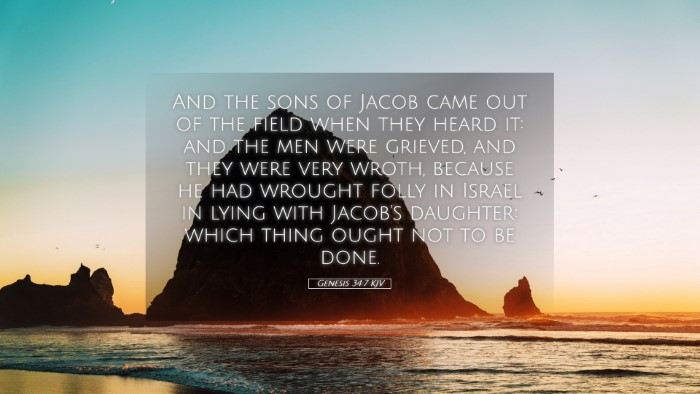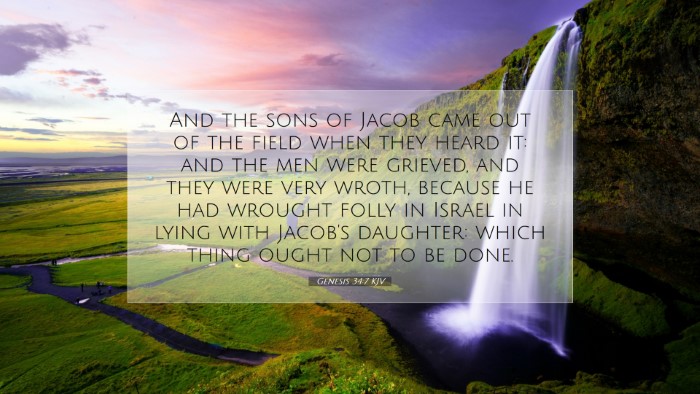Commentary on Genesis 34:7
Bible Verse: "And the sons of Jacob came out of the field when they heard it: and the men were grieved, and they were very wroth, because he had wrought folly in Israel in lying with Jacob's daughter; which thing ought not to be done." (Genesis 34:7)
Contextual Background
The events in Genesis 34 unfold against the backdrop of Jacob's recent return to Canaan after years of laboring in Laban's household. The narrative centers on the incident involving Shechem, the son of Hamor the Hivite, who defiled Dinah, Jacob’s daughter. This act provoked extreme anger from her brothers and initiated a series of actions that would have lasting implications for the family and the surrounding nations.
Exegesis and Interpretation
In this verse, the focus lies on the reaction of Jacob’s sons upon hearing the news of their sister’s dishonor. Their grief and wrath reveal not just personal anguish but also illustrate broader themes of honor, justice, and societal norms within Israelite culture.
Grief and Wrath
The emotions expressed by Jacob's sons are significant. According to Matthew Henry, their grief is emblematic of the severe breach of familial and societal honor that the incident represents. In the ancient Near Eastern context, inter-familial relations were of paramount importance, and the act of violation against Dinah was not just a personal affront but a deep-seated societal issue.
Sin and Folly
Henry further notes that the term "folly" used here indicates a moral failing that was profoundly unacceptable within their community. In this passage, Shechem's actions are viewed as a disgrace that polls the social fabric of Israel. There is a clear implication that Shechem's conduct stands in direct opposition to God's design for purity and familial respect.
Albert Barnes’ Insights
Albert Barnes emphasizes the collective concern of Jacob’s sons. He points out that they act out of a sense of justice and protecting their family’s honor. The act of taking a sister in such a manner was not merely a personal sin; it was an affront to their father, their family, and possibly the covenant community as a whole.
Adam Clarke’s Commentary
Adam Clarke expands on the implications of Shechem’s actions. He highlights that this incident not only brings forth the immediate anger of the brothers but also sets the stage for profound conflict between the Israelites and the Hivites. Clarke remarks on the importance of the brothers' response, implying that their actions would define their character and the legacy of the family to come.
Theological Reflections
From a theological standpoint, Genesis 34:7 prompts consideration of the nature of sin and its consequences. The reaction of Jacob's sons underscores the principle that acts of moral failure have reverberating impacts beyond the immediate parties involved. Theological principles regarding covenant fidelity, community integrity, and the seriousness of sexual immorality come into sharp relief through this narrative.
Honor and Shame
Honor and shame play critical roles in this passage. The brothers’ response can be seen as a protective measure over family honor, which reinforces the socio-cultural values of the time. The expectation of familial loyalty and the ramifications of dishonor are pivotal themes that resonate throughout the Biblical narrative.
Judgment and Justice
The call for justice is implicit in the anguish of the brothers. Matthew Henry notes that their 'wrath' is justified in light of the outrage done to their sister and their family. It reflects an intrinsic understanding that justice must be served when such transgressions occur, especially against vulnerable members of the community.
Foreshadowing Conflict
The verse foreshadows a violent response that Jacob's sons will take against Shechem and his people, illustrating the severity of the situation. The detrimental cycle of violence initiated by this act becomes a cautionary tale regarding the consequences of failing to uphold the ethical standards mandated by God.
Implications for Today
For pastors, students, and theologians, Genesis 34:7 serves as a profound narrative that can inform discussions on ethics, justice, and community dynamics in the face of moral failures. It invites reflection on how communities today respond to sin, the importance of accountability, and the need for restorative justice.
Faith Community Responses
Modern faith communities can learn from the responses of Jacob's sons. There is a need for balance between justice and grace, understanding the importance of protecting the vulnerable while also pursuing reconciliation where possible. Discussions on how to confront sin within the community without resorting to violence are critical for Christian ethics today.
Conclusion
Genesis 34:7 encapsulates a moment of tension that intertwines familial loyalty, societal justice, and the pursuit of righteousness. Through the insights of Matthew Henry, Albert Barnes, and Adam Clarke, we are challenged to consider how we might respond to acts of injustice in our own contexts and the importance of upholding both honor and justice in a world that often blurs these lines.


